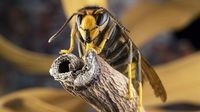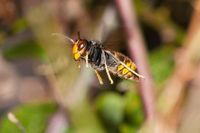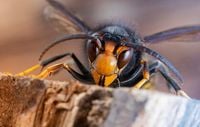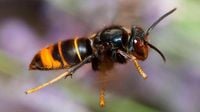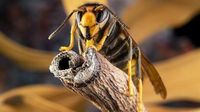Experts are raising alarms as record numbers of Asian hornets have been spotted on the British island of Jersey, igniting fears for the future of the UK’s honeybee population. The invasive species, known for its voracious appetite for bees, has seen an astonishing rise in sightings this spring, prompting urgent calls for public vigilance and action.
The Asian hornet, scientifically known as Vespa velutina, was first detected in the UK in 2016 and has since spread across Europe. It is capable of consuming up to 50 honeybees a day, leading to devastating impacts on bee colonies. In France, where the hornet has established a significant presence since its accidental introduction in 2004, it is estimated that nearly one-third of honeybee colonies have been wiped out due to predation by these insects.
As of April 11, 2025, Jersey has reported 262 sightings of queen Asian hornets, marking a staggering increase of 1,090 percent compared to the same date last year. John De Carteret, a founding member of the Jersey Asian Hornet Group, expressed his concerns, stating, "The first queens were more than two weeks early this year. We’re obviously concerned." This early surge in hornet activity is attributed to a dry and sunny spring, which experts believe could further escalate their numbers across the UK.
Ian Campbell from the British Beekeepers Association warned that this year could see hornet populations reach levels even higher than those recorded in 2023. He noted, "There’s a strong risk of this year’s numbers being at least as high as in 2023 and the potential to be even higher." The rapid spread of the species in Europe poses a significant threat not just to honeybees but to the entire ecosystem, as these hornets feed on a wide array of insects, including vital pollinators.
The Asian hornet is distinguishable by its dark velvety body and striking yellow legs, which give it the nickname “yellow-legged hornet.” It is slightly smaller than the native European hornet but poses a much greater threat to honeybees. Each nest can produce around 350 fertilized queens annually, with a single colony capable of killing up to 90,000 pollinators in a season.
In an effort to combat this invasive species, the UK government has implemented measures including trapping and destroying nests. The Department for Environment, Food and Rural Affairs (Defra) has urged the public to report any sightings via the Asian Hornet Watch app, emphasizing the importance of early detection in controlling the hornet population. Defra has also set up a network of traps across the country to monitor and manage the situation.
Recent studies have highlighted the ecological impact of Asian hornets. A report from the University of Exeter revealed that these hornets prey on at least 1,400 different insect species, significantly impacting biodiversity. The study found that the hornets consumed a variety of insects, including the European honeybee, bumblebees, and other essential pollinators, which are already under threat from environmental changes and agricultural practices.
Despite the alarming rise in sightings, only two hornets have been officially confirmed in the UK this year, located in Shropshire and Kent. However, experts caution that the actual number of hornets may be much higher, as many sightings go unreported. "It would be a surprise if numbers were not above the 2024 level," Campbell stated, reflecting the growing concern among beekeepers and environmentalists alike.
The hornets are not only a threat to bees but also to human health, as their sting can cause severe allergic reactions in sensitive individuals. While they are not generally aggressive, they can become defensive of their nests and may sting if provoked.
As the weather warms and the hornets become more active, the risk of them establishing a permanent breeding population in the UK increases. Campbell noted, "There’s a significant risk that Asian hornets will establish a permanent breeding population. They are very successful, very adaptive, and the climate presents no problems for them." This adaptability, combined with the potential for new queens to arrive from Europe, poses a daunting challenge for containment efforts.
In 2023, the National Bee Unit managed to destroy 72 nests across 56 locations, a significant increase from just one nest the previous year. Most of these nests were concentrated along the southern coast, particularly in Kent, which has been identified as a hotspot for hornet activity. The seaside town of Folkestone alone accounted for 21 nests destroyed in 2023.
With the situation evolving rapidly, experts are urging the public to remain vigilant and report any sightings of Asian hornets immediately. The Asian Hornet Watch app allows users to document sightings and help authorities track the spread of this invasive species. The stakes are high, as the future of the UK’s honeybee population—and by extension, its agricultural productivity—hangs in the balance.
In conclusion, the unprecedented early sightings of Asian hornets in Jersey signal a potentially catastrophic year for the UK’s pollinators. As experts warn of the devastating impacts on honeybee populations, proactive measures and public participation will be crucial in combating this invasive threat.
